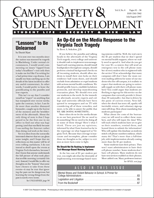Walking a Tightrope in Search and Seizure Cases
Author: Ralph Gerstein.
Source: Volume 10, Number 01, Fall 2008 , pp.1-7(7)

next article > |return to table of contents
Abstract:
College administrators and security officials are under pressure to keep their premises free of drugs, violent crime, and property crimes, such as burglary or computer hacking. Failure to catch the perpetrator can have serious consequences. If officials get careless, however, and conduct searches that violate constitutional rights, a court may grant a motion to suppress, and the time and effort expended on catching the perpetrator will have been wasted. The Fourth Amendment of the United States Constitution (and most state constitutions) protects against unreasonable searches and seizures. In the college context, this means that college students have a reasonable expectation of privacy. For example, a student who occupies a college dorm has the protection of the Fourth Amendment ( Piazzola v. Watkins , 442 F2d 284 (5th Cir. 1971)).Keywords: Piazzola v. Watkins; State of Washington v. Houvener; State v. Dalton; Mazuz v. State of Maryland; People v. Superior Court of Santa Clara County; Grubbs v. State of Texas; U.S v. Heckenkamp;
Affiliations:
1: Co-Editor .